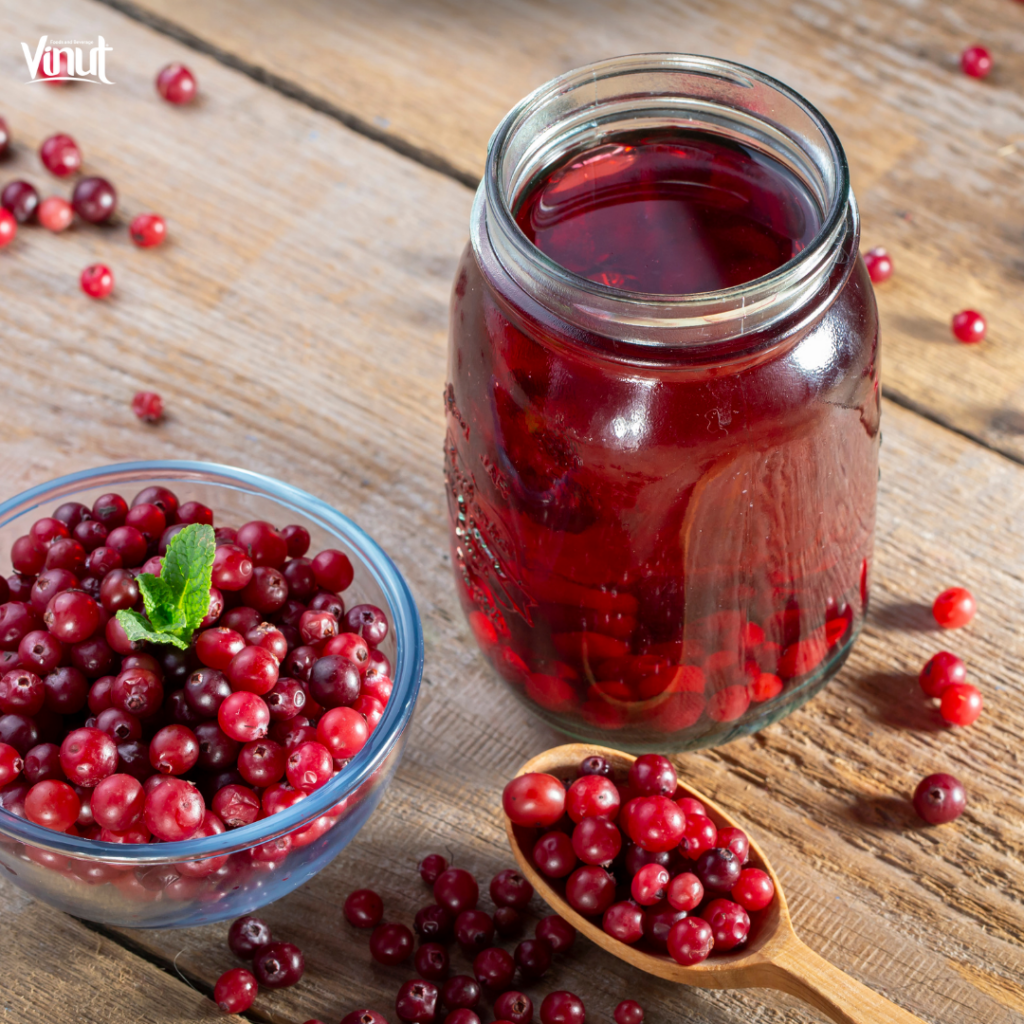
News
Can You Drink Too Much Cranberry Juice?

Cranberry juice is often touted as a superfood with numerous health benefits. From its potential to prevent urinary tract infections (UTIs) to its high antioxidant content, cranberry juice has found its place in the daily routines of many health-conscious individuals. But as with anything good, there comes the question: can you drink too much cranberry juice? In this article, Cojo Cojo ‘ll explore the potential benefits and risks associated with excessive consumption of cranberry juice, providing a well-rounded perspective on how much is too much.

Table of Contents
Nutritional Profile of Cranberry Juice
Before delving into the potential risks of overconsumption, it’s essential to understand what makes cranberry juice so beneficial. Here’s a quick look at the nutritional profile of cranberry juice:
Vitamins and Minerals
Cranberry juice is rich in vitamins C, E, and K, as well as several essential minerals like potassium and manganese. These nutrients play crucial roles in various bodily functions, from boosting the immune system to supporting bone health.
Antioxidants
Cranberries are packed with antioxidants, including flavonoids and polyphenols, which help protect the body against oxidative stress and inflammation. These antioxidants are one of the main reasons why cranberry juice is so highly regarded in the health community.
Low Calorie Content
Cranberry juice is relatively low in calories, making it a popular choice for those looking to maintain or lose weight. However, many commercial cranberry juices contain added sugars, which can significantly increase their calorie content.

Health Benefits of Cranberry Juice
Cranberry juice offers several health benefits, which is why it’s often included in various health and wellness regimens. Here are some of the key benefits:
Prevention of Urinary Tract Infections (UTIs)
One of the most well-known benefits of cranberry juice is its potential to prevent UTIs. The juice contains compounds called proanthocyanidins, which may prevent bacteria from adhering to the walls of the urinary tract.
Rich in Antioxidants
As mentioned earlier, cranberry juice is rich in antioxidants, which help combat oxidative stress and reduce inflammation. This can lead to a reduced risk of chronic diseases such as heart disease and certain cancers.
Supports Digestive Health
Cranberry juice may also support digestive health by promoting the growth of beneficial gut bacteria. Additionally, it can help prevent the formation of stomach ulcers by inhibiting the growth of H. pylori bacteria.
Heart Health
The antioxidants in cranberry juice may help reduce the risk of heart disease by lowering blood pressure, reducing cholesterol levels, and preventing the formation of blood clots.

The Risks of Drinking Too Much Cranberry Juice
While cranberry juice offers several health benefits, it’s important to be mindful of the potential risks associated with excessive consumption. Drinking too much cranberry juice can lead to several issues, which we’ll explore below.
High Sugar Content
One of the main concerns with drinking too much cranberry juice is its sugar content. Many commercial cranberry juices are loaded with added sugars, which can contribute to weight gain, increase the risk of type 2 diabetes, and negatively impact dental health.
Stomach Discomfort
Cranberry juice is acidic, and consuming it in large quantities can lead to stomach discomfort, including symptoms like heartburn, indigestion, and diarrhea. This is particularly true for individuals who are sensitive to acidic foods and drinks.
Kidney Stones
Cranberries contain a high amount of oxalates, compounds that can increase the risk of kidney stone formation in susceptible individuals. If you are prone to kidney stones, it’s advisable to limit your intake of cranberry juice.
Interference with Medications
Cranberry juice can interact with certain medications, particularly blood thinners like warfarin. This interaction can increase the risk of bleeding, so it’s important to consult with a healthcare provider if you are on any medications and considering drinking cranberry juice regularly.

How Much Cranberry Juice is Too Much?
So, how much cranberry juice can you safely consume? While there isn’t a one-size-fits-all answer, moderation is key. Here’s a general guideline:
Recommended Intake
For most people, drinking one to two servings (about 8-16 ounces) of cranberry juice per day is considered safe and beneficial. This amount should provide you with the health benefits without posing significant risks.
Signs of Overconsumption
If you experience any of the following symptoms after drinking cranberry juice, it might be a sign that you’re consuming too much:
- Stomach upset or gastrointestinal discomfort
- Frequent heartburn or acid reflux
- Unexplained weight gain (possibly due to high sugar content)
- Kidney pain or signs of kidney stones

Alternatives to Cranberry Juice
If you love cranberry juice but are concerned about the risks of overconsumption, consider these alternatives:
Diluted Cranberry Juice
One way to reduce the risks associated with cranberry juice is to dilute it with water. This can help lower the sugar content and reduce the acidity while still allowing you to enjoy the flavor and some of the health benefits.
Low-Sugar Cranberry Juice
Look for cranberry juices that are labeled as “low sugar” or “no added sugar.” These options are often healthier and reduce the risks associated with high sugar intake.
Cranberry Supplements
Cranberry supplements, available in capsule or tablet form, can provide some of the benefits of cranberry juice without the added sugars and calories. However, it’s essential to choose high-quality supplements and consult with a healthcare provider before starting any new supplement regimen.
Other Healthy Juices
If you’re looking to diversify your juice intake, consider other healthy options like pomegranate juice, blueberry juice, or cherry juice. These juices offer similar antioxidant benefits and can be a great addition to your diet.

Expert Insights on Cranberry Juice Consumption
To gain a better understanding of how much cranberry juice is safe to drink, I consulted with nutrition experts. Here’s what they had to say:
Nutritionist’s View
According to nutritionists, while cranberry juice can be a healthy addition to your diet, it’s important to consume it in moderation. They recommend sticking to one serving per day, especially if you are sensitive to acidic foods or prone to kidney stones.
Doctor’s Advice
Doctors also advise caution when it comes to cranberry juice, particularly for individuals on certain medications. They emphasize the importance of consulting with a healthcare provider before incorporating large amounts of cranberry juice into your diet, especially if you are on blood thinners or have a history of kidney stones.
Practical Tips for Incorporating Cranberry Juice into Your Diet
If you enjoy cranberry juice and want to include it in your diet safely, here are some practical tips:
Moderation is Key
As with anything, moderation is crucial. Stick to one or two servings of cranberry juice per day to enjoy the benefits without overdoing it.
Read Labels Carefully
When purchasing cranberry juice, be sure to read the labels carefully. Look for options that are low in sugar and free from artificial additives.
Pair with a Balanced Diet
Incorporate cranberry juice into a balanced diet rich in fruits, vegetables, lean proteins, and whole grains. This will help you get the nutrients you need while minimizing the risks associated with overconsumption of any single food or drink.
Use as a Flavor Enhancer
Instead of drinking cranberry juice by itself, consider using it as a flavor enhancer in smoothies, salad dressings, or marinades. This allows you to enjoy the taste without consuming large quantities.
Conclusion
Cranberry juice can be a healthy and refreshing addition to your diet, offering numerous benefits like preventing UTIs, supporting heart health, and providing a rich source of antioxidants. However, as with any food or drink, moderation is essential. Drinking too much cranberry juice can lead to potential risks, including high sugar intake, stomach discomfort, and an increased risk of kidney stones.
To enjoy the benefits of cranberry juice without the drawbacks, aim to consume it in moderation, choose low-sugar options, and consult with a healthcare provider if you have any concerns or are taking medications that might interact with cranberry juice.
FAQs
1. Can drinking too much cranberry juice cause kidney stones?
Yes, cranberry juice is high in oxalates, which can increase the risk of kidney stone formation in susceptible individuals. If you have a history of kidney stones, it’s best to limit your intake of cranberry juice.
2. Is it safe to drink cranberry juice every day?
Yes, it is generally safe to drink cranberry juice every day in moderation. However, sticking to one or two servings per day is advisable to avoid potential risks such as high sugar intake or stomach discomfort.
3. Can cranberry juice interfere with medications?
Yes, cranberry juice can interact with certain medications, particularly blood thinners like warfarin. If you are on medication, consult with your healthcare provider before consuming large amounts of cranberry juice.
4. What are the signs of drinking too much cranberry juice?
Signs of overconsumption include stomach upset, frequent heartburn, unexplained weight gain, and symptoms of kidney stones. If you experience any of these, it may be a sign that you are drinking too much cranberry juice.
5. Are there alternatives to cranberry juice that offer similar health benefits?
Yes, other juices like pomegranate juice, blueberry juice, and cherry juice offer similar antioxidant benefits. You can also consider cranberry supplements as an alternative to the juice itself.
